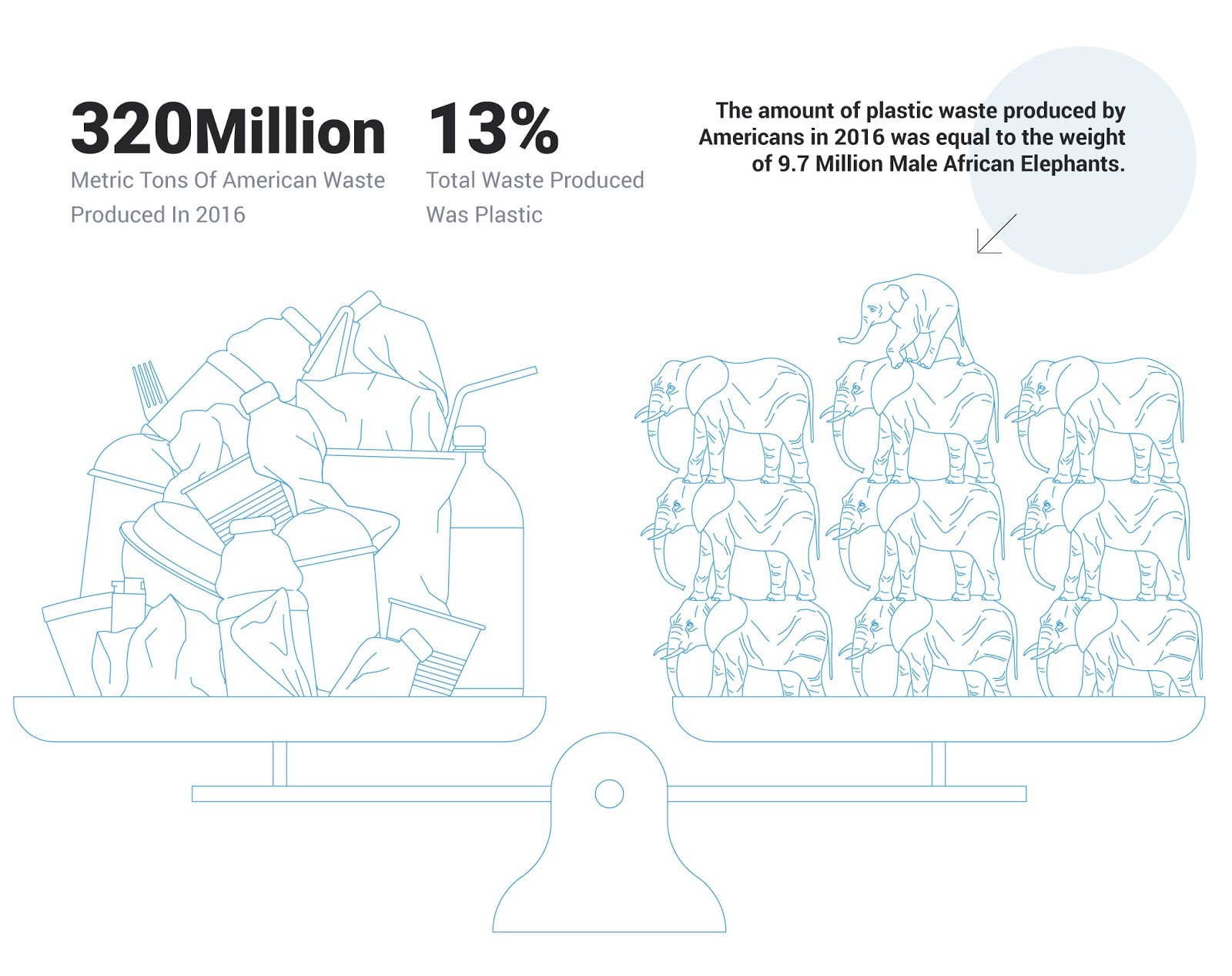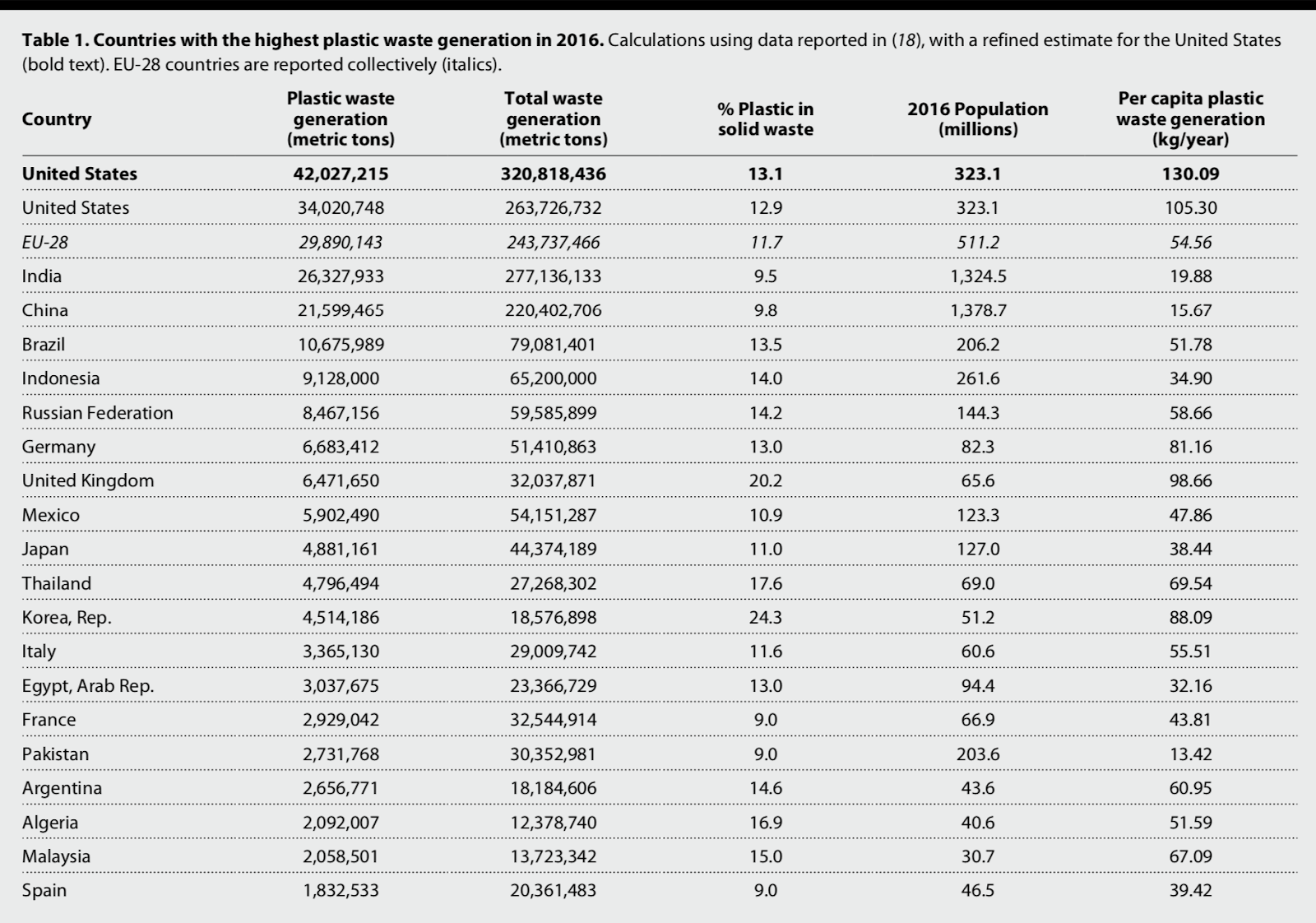
Written by Jennie Romer and Lily Iserson
In 2016, the U.S. generated 42 million metric tons of plastic waste, more than any other country in the world. This startling number is one of the key takeaways from a recent study in Science Advances, The United States’ contribution of plastic waste to land and ocean, by Law et. al. The study analyzes not only generation but also the impact of where America’s plastic waste ends up. Researchers found that in 2016, the amount of plastic waste generated in the U.S. estimated to enter the coastal environment — either illegally dumped in the U.S. or collected in the U.S. for recycling and exported to countries where it was inadequately managed — was among the highest in the world.
This flips on its head the plastics industry’s talking points, and even the U.S. EPA’s talking points, that blame Asian countries for plastic pollution overall. The numbers in the new report run counter to that accusation. In reality, the U.S. adds to the waste management problems of countries like India, Malaysia, and Indonesia because we unload our waste onto their lack of sustainable infrastructure.
“Without waste management infrastructure improvements,” a related research group wrote in a 2015 study, “the quantity of plastic waste entering the ocean from land is predicted to increase by an order of magnitude by 2025.” The new report expands this previous inquiry by focusing on the relationship between plastic pollution and inadequate waste management.

Getting into the numbers
Using data from the World Bank and municipal solid waste facilities in the U.S., the research group estimated the amount of plastic that entered the environment in 2016. Of 320 million metric tons of American waste produced in 2016, 13.1% of our trash was plastic. That’s over 16,000 Olympic swimming pools, 18 million Ford F-150 trucks, or 9.7 million male African elephants.
The study also revealed that littering and illegal dumping is widespread throughout the U.S. By looking at dumpsites in Sacramento, CA, San Diego, CA, as well as Columbus, OH, the study estimated that illegally dumped plastic waste in the U.S. scaled between 139,900 to 414,600 metric tons.
By comparing the U.S. with other countries, researchers demonstrated that EU countries collectively generated more plastic waste than either India or China, despite having only ~40% of the population. The U.S. total plastic waste nonetheless obscured all of these regions.
-4174-1604983440-2.jpg)
American waste management has become a global concern
Solid waste assessments by the EPA neglect to consider what happens to our recycling after it’s collected. They do not account for how much is actually recycled and/or how much is shipped to other nations that lack the infrastructure to deal with it. This often means that we contribute to preexisting waste problems in other countries.
Our main focus at the Surfrider Foundation is on source reduction, first for the reduction of single-use plastics and second for effectively recycling all remaining plastics. This new report reveals how mismanaged recycling is a cause for special attention, illuminating how widespread plastic reduction can more effectively combat plastic pollution than compromised recycling practices.
Here are some major takeaways from the study:
-
“Although 9.3% of the plastic waste generated in the United States in 2016 was collected for recycling, the global market-driven export mainly to lower-income countries for processing ultimately resulted in substantial leakage of plastics to the environment.”
“The total mass of plastic scrap exported by the United States to countries with greater than 20% inadequately managed waste was 1.76 Mt [million metric tons], which is 88.7% of the total plastic scrap exported by the United States in 2016.”
The study also notes how 75.4% of our plastic waste is disposed in landfills, and 15.3% is incinerated. Only 9.3% is sent for recycling in the first place.
The U.S. must be held accountable for our plastic problem, and for how our waste management systems take advantage of global disparities when we outsource plastic waste year in and year out. Policies we support at the Surfrider Foundation — including the Break Free from Plastic Pollution Act of 2020 — are explicitly named in the study as solutions that help to eliminate our plastic pollution at home and abroad.
Over the last decade, Surfrider has achieved 280 plastic pollution victories at the local, state, and local levels. The study’s recommended next steps — which include source reduction of plastics, adequate end-of-life management, as well as extended producer responsibility — align with Surfrider’s proven strategies and policy recommendations. As additional studies come to light, the Surfrider Foundation will continue to review and share the most relevant studies.
You can take action on plastic waste now.

